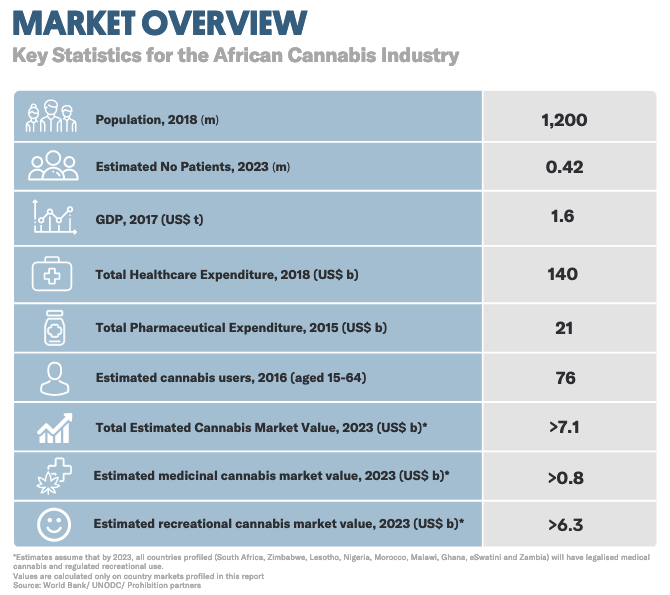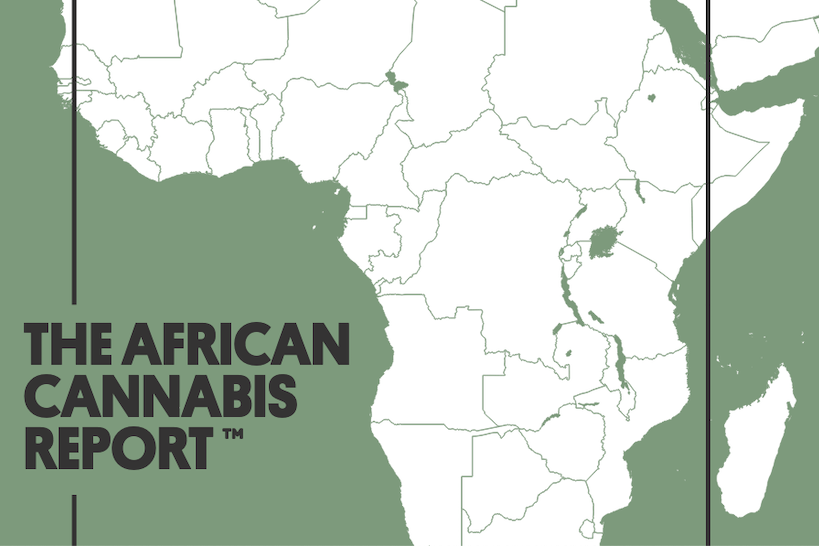By Barnaby De Hoedt
A legal cannabis industry in Africa could be worth more than $7.1bn a year by 2023 if legislation is introduced in a number of the continent’s major markets, according to The African Cannabis Report by Prohibition Partners.
The report notes that the continent has a long history of cannabis cultivation. The plant’s medicinal properties have given it “an exalted status in local folklore”, says the report. “It is thought that smoking pipes were first invented in sub-Saharan Africa as early as 600BC, and traces of cannabis have been found in Egyptian mummies – used by ancient Egyptians to ward off depression and other psychological illnesses.”
Fancy that!
More recently many farmers in Africa have turned to illegal cannabis cultivation as the only means of subsistence following a decline in demand for other crops such as tobacco. The UN estimates that 38,000 tonnes of illegal cannabis is produced across Africa each year, with a market value of billions of dollars. “This agricultural expertise in cannabis farming could position Africa as a leading producer of cannabis,” says the report.
While international demand from African exports would be high, Africa itself has one of the highest user rates in the world, at 13.2% – 76 million from a population of 1.2 billion.
The international prohibition of cannabis in the past century has been perhaps even more devastating to Africa than any other continent. As social anthropologist Dr Axel Klein indicated to the Cannabis Industries Wales in January, it has been a main cause of desertification. In Malawi, for example, 97% of households do not have access to electricity; families have to use wood for domestic fuel and so this has led to rampant deforestation. All this time, cannabis and hemp could have been used to produce biofuel.

“We are proposing is that we find biofuels, something they can grow instead of trees,” said Klein, of the Global Drug Policy Observatory. “The ideal crop for that is cannabis, is hemp. It grows very fast, 90-120 days; it provides a lot of biomass, 6-10 tonnes per hectare, which can be dried and turned into briquettes which can be burned instead. The cycle is so short it enriches the soil, allowing farmers to grow it for part of the year and combine it with a food crop like maize. And the processing can be done in smaller areas, which allows the farmers to add value, a key driver of lifting people out of poverty.”
Make no mistake – a cannabis and hemp industry that really took advantage of Africa’s landmass could go a long way towards healing the continent’s ravaged environment and transform it into the workshop of the world – given that almost anything can be made from hemp – solving its high unemployment problem. And with each ton of hemp grown representing 1.63 tons of CO2 absorption, doing this should be an international priority in order to stabilise the climate and prevent runaway climate change (coupled with ending fossil fuel use, of course)
Back to the Prohibition Partners report. It says Africa is a “central hub for cannabis trafficking with Ghana, Nigeria, eSwatini (formerly known as Swaziland) being the most notable points of distribution”.
“South Africa is a key market for cannabis. The cannabis produced in Africa is often not intended for a domestic market (according to the Narcotics Control Board, half of all cannabis produced in Ghana has been destined for export since the late 1980s). In Lesotho, all cannabis supplies will remain slated for export until new local laws legalise medicinal or recreational use of the drug.”
Lesotho is the first country in Africa to begin legal cultivation and has already began to attract investment. Its high-altitude mountainous region has an abundant water source and rich, fertile soil, making it an ideal region for cannabis cultivation.
The report says that South Africa and Nigeria potentially represent Africa’s two largest value medicinal cannabis markets at $667m and $75m by 2023 respectively.

Africa’s “inadequate” healthcare system, especially bad in rural areas, means that even if medicinal cannabis were to be legalised across the continent, “access to products could be significantly thwarted without the support of the NGOs, charities and other donors who provide a significant proportion of the region’s healthcare supplies”. One guarantee of success in Africa therefore “will be found in ensuring the safe and formal accessibility of cannabis-medications”.
The poor economic conditions faced by many African countries means any legalisation of cannabis in the region “will have a duty to safeguard local interests”. Quite right, too. “In this respect Zimbabwe could become a regional blueprint as licence applications can only come from those who can prove citizenship or residency. However, the Health Minister retains the rights to permit exemptions.”
One other problem cited is the assertion that “setting up commercial cannabis operations could be expensive given the paucity of irrigation infrastructure”. How ironic. The state of Africa’s arid land owes a lot to the prohibition of cannabis. It will take cannabis itself then to restore the health of the earth and gradually provide the basis for the irrigation infrastructure needed for the industry’s further expansion.




